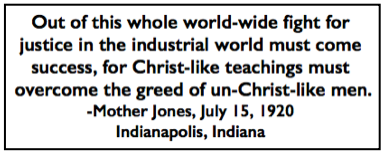 —————
—————
Hellraisers Journal – Friday December 5, 1913
Mother Jones Opines on Churches, Labor Unions and Christianity
From the Chicago Day Book of December 1, 1913
-Mother Jones Interviewed by Jane Whitaker:
 —————
—————
Hellraisers Journal – Friday December 5, 1913
Mother Jones Opines on Churches, Labor Unions and Christianity
From the Chicago Day Book of December 1, 1913
-Mother Jones Interviewed by Jane Whitaker:
 —————
—————
Hellraisers Journal – Thursday November 6, 1913
Southern Colorado Coalfields – State Militia Arrives, Strikers Standing Firm
From the Denver United Labor Bulletin of November 1, 1913:
[Captain Van Cise Issues “Shoot to Kill” Orders:]
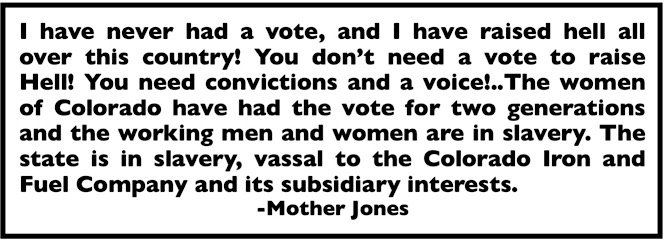 —————
—————
Hellraisers Journal – Tuesday October 28, 1913
Mother Jones Lectures Rich Suffragettes on Suffering of Miners’ Wives
From the Chicago Day Book of October 27, 1913:
RICH SUFFRAGETS KNOW NOTHING OF
MINERS’ WIVES’ SUFFERING
SAYS MOTHER JONESBY WM. G. SHEPHERD
Trinidad, Col., Oct. 27.-Mother Jones, 81, here fresh from the West Virginia prisons to help Colorado coal strikers, recently gave me her opinion on women’s suffrage.
From what I see of conditions in this corrupted state of Colorado, where they have had women’s suffrage for 14 years, it seems to me that the influence of women has been utterly useless. I wish Mrs. Pankhurst would frame me a statement as to why women’s suffrage has failed so utterly in Colorado. Conditions of women and children in mining districts are worse than in any other part of the United States.
This state is owned by corporations. Votes of the women of Colorado have never helped Colorado women and children, made their lives easier or lessened their toil or gained for them any additional human rights.
The rights of lower classes are less respected in this great woman suffrage state than in West Virginia, where women don’t vote. It is like prescribing cough medicine to cure consumption for Mrs. Pankhurst to suggest votes for women as a cure for economical slavery.
Mrs. Pankhurst doesn’t understand problems of the lower classes; she belongs to the upper classes. What does Mrs. Belmont or Mrs. Mackay or other rich women who surround Mrs. Pankhurst know about suffering of miners’ wives and infants? Mrs. Pankhurst travels with women who are opposed to what laboring classes of America stand for. They demand to know what right Mrs. Pankhurst has to associate with such women at the same time she talks about uplifting the world. The consumptive, economical America needs something more than Mrs. Pankhurst’s celebrated cough syrup. I wish Mrs. Pankhurst were coming to speak to the women in the tented camps of the coal strikers of Colorado. It would be more of a lesson for Mrs. Pankhurst than for the wives.
[Emphasis added.]
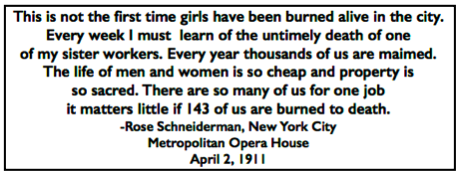 —————
—————
Hellraisers Journal – Friday October 17, 1913
Max Blanck, of Triangle Fire Infamy, Fined $20 for Locking Up Yet Another Firetrap
From the Miners’ Magazine of October 16, 1913:
From Collier’s Magazine of May 7, 1913:
From the Chicago Day Book of September 26, 1913:
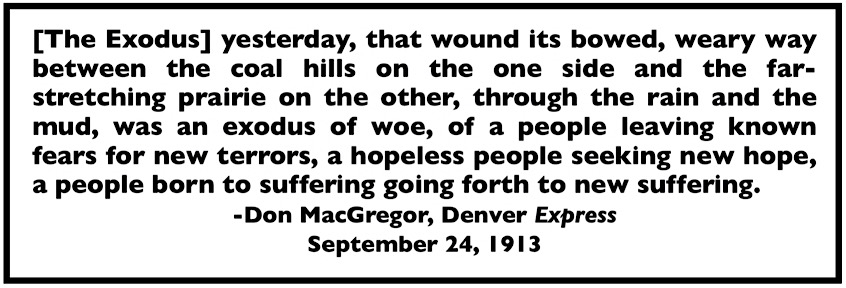 —————
—————
Hellraisers Journal – Wednesday October 15, 1913
Ludlow Tent Colony, Colorado, Sunday September 28th
-Don MacGregor Visits Miner’s Tent, Describes Conditions
From the Chicago Day Book of October 4, 1913:
 —————
—————
Hellraisers Journal – Friday October 10, 1913
Calumet, Michigan – Annie Clemenc, Leader of Women and Strike Sympathizers
From The Day Book of October 8, 1913:
The news dispatches tell of the arrest of Annie Clemenc, leader of the women strike sympathizers at Calumet, Michigan-the woman who has carried the American flag at the head of the striking miners daily parade.
But that doesn’t tell very much. It doesn’t tell the story of Annie Clemenc. The name means nothing to you who read the mere statement that Annie Clemenc was arrested.
But I have met Annie Clemenc. I have talked with her. I have seen her marching along the middle of the street, carrying that great American flag. It is a silk flag. The staff must be fully two inches thick.
When I read that Annie Clemenc has been arrested I think of the dirty little jail in Calumet. And I think of Joan of Arc and the Goddess of Liberty. Then I think of the notable women I have seen in New York, in San Francisco, in Chicago and in Washington.
Early one morning I trudged along the road, walking at one side with Moyer, president of the Western Federation of Miners, as the parade went from Red Jacket to Laurium and back. Women were in the front-miners’ wives, miners’ daughters-and Annie Clemenc, heroine, marched with them and carried the flag.
Annie Clemenc is a miner’s wife. A Croatian [Slovenian], she was born in this county and educated in the schools of Calumet. If she were dressed in the fashion people would turn to look at her if she walked down State street or Fifth avenue. Even in her plain dress she is a striking figure. Strong, with firm but supple muscles, fearless, ready to die for a cause, this woman is the kind all red-blooded men could take their hats off to.
A militia officer said to me at Calumet: “If McNaughton could only buy Big Annie he could break this strike.”
I suppose Annie Clemenc knows what it is to go hungry, but I don’t believe all the millions of dividends ever taken out of the Calumet & Hecla mine could buy her.
The day when the soldiers rode down the flag Annie Clemenc stood holding the staff of that big flag in front of her, horizontally. She faced cavalrymen with drawn sabers, infantrymen with bayonetted guns. They ordered her back. She didn’t move an inch. She defied the soldiers. She was struck on her right wrist with a bayonet, and over the right bosom and shoulder with a deputy’s club.
[She said:]
Kill me. Run your bayonets and sabers through this flag and kill me, but I wont go back. If this flag will not protect me, then I will die with it.
And she didn’t go back. Miners rushed up, took the flag and got her back for fear she might be killed.
After the parade one morning Annie Clemenc came up to the curb where President Moyer was standing. I was there.
Looking up at him she said:
It’s hard to keep one’s hands off the scabs.
I asked her if the big flag wasn’t heavy.
[She said:]
I get used to it. I carried it ten miles one morning. The men wouldn’t let me carry it back. I love to carry it.
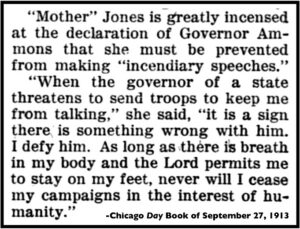 —————
—————
Hellraisers Journal – Tuesday October 7, 1913
Colorado Strike Zone – Policy Committee Issues Statement; Mother Jones Speaks
From the Trinidad Chronicle News of September 26, 1913:
In a general statement issued last night the district policy committee of United Mine of America composed of Frank J. Hayes, John McLennan, John H. Lawson and E. L. Doyle declared their position as follows:
We desire law and order above all things. We shall try to conduct this strike in such a way to command the respect of the public and civil authorities. A man who commits or talks violence as a means to win this strike is not properly representing the mine workers’ organisation.
We depend for success on the justice of our cause. We request the operators to warn their imported gunmen to respect the law and to cease their intimidation of union miners.
We have cautioned our people in this respect and we ask the operators to do likewise. Our responsibility in this matter is the same and we ought to meet it like men.
There is no occasion for the alleged purpose of protecting property. It is an evidence of weakness on the part of operators and is a reproach to all law abiding citizens. There is no need for the operators or their agents to ship hundreds of rifles into this region as they are doing at present for the purpose of intimidating peaceful lawsabiding people. We propose to the beet of our ability to protect life and property and to safeguard the liberties of our people by lawful means.
The strike is complete in every particular. The best in the history of our organisation, notwithstanding statements to the contrary, and the miners of Colorado will remain out of the mines until their rights are fully recognized.
At the scene of the Segundo tragedy [September 24th killing of C. F. I. “Marshal”]…Mother Jones [yesterday, September 25th] delivered another impassioned speech to miners, urging the men to remain on strike until the operators meet the full demands. No illusion was made to the killing of Marshal Lee…..
[Photograph and emphasis added.]
———-
From The Rocky Mountain News of September 27, 1913
Strikers congregated in front of the town hall, where more than 3,000 listened to “Mother” Jones and other strike sympathizers (“Mother” Jones in the center).
——
 —————
—————
Hellraisers Journal – Sunday October 5, 1913
Annie Clemenc, Wife of Striking Miner, Arrested Yet Again
From the Michigan Miners’ Bulletin of October 2, 1913
A Woman’s Story
At Seventh Street Tuesday morning a party of strikers met a man with a dinner bucket. I asked him: “Where are you going, partner?” He replied: “To work.” “Not in the mine are you?” “You bet I am.” after talking with him a while his wife came and took him down the street. She seemed very much afraid.
He had just gone when a couple of Austrians came along with their buckets. I stepped up to one I knew: “O! George, you are not going to work, are you? Come, stay with us. Don’t allow that bad woman to drive you to work. Stick to us and we will stick to you.” He stepped back, willing to comply with my request.
Then the deputies came, caught him by the shoulder and pushed him along, saying: “You coward, are you going back because a woman told you not to go to work?” The deputies, some eight or ten of them, pulled him along with them.
A militia officer, I think it was General Abbey, said: “Annie, you have to get away from here.” “No, I am not going. I have a right to stand here and quietly ask the scabs not to go to work.”
I was standing to one side of the crowd and he said: “You will have to get in the auto.” “I won’t go until you tell me the reason.” Then he made me get in the auto. I kept pounding the automobile with my feet and asking what I was being taken to jail for. The officer said: “Why don’t you stay at home?” “I won’t stay at home, my work is here, nobody can stop me. I am going to keep at it until this strike is won.” I was kept in jail from six-thirty until twelve, then released under bond.
[Newsclip added. Emphasis added.]
Note that Annie was arrested by the military only for talking quietly to the scabs. The deputies who man-handled the scab and forced him to go to work against his will were not in any way molested by the military.
This same issue of the Miners’ Bulletin (page 2) contains an affidavit sworn to and signed by 24 strikebreakers. They tell of being shipped into the Copper Country under false pretenses, of being beaten when they refused to work after they realized that a strike was on, of then being kept prisoner in a boarding house for refusing to work, and of not being paid for the work that they did do. These men were finally released, and then made their way to the Union Hall. They swore out their affidavit on Sept. 29 in Houghton County.
And thus, not only do the soldiers not prevent the deputies from making prisoners of imported workers who refuse to be turned into scabs, but the soldiers actively assists these deputies. In fact, many of the soldiers have been made deputies once their term of service ends.
On Wednesday, October 1, Annie, known as the Joan of Arc of the striking copper miners, was arrested yet again, this time by a Major Harry Britton. Annie was marching at the head of 400 strikers, carrying her huge American flag as usual. They were on their way to perform picket duty at the mines when they were stopped by deputies and cavalrymen with Major Britton in command.
Major Britton attempted to arrest Annie, claiming she spit at a scab. When the Major used his sword to beat back a striker who came to Annie’s aid, other strikers joined in the fray. Cavalrymen then charged into the midst of the strikers. Major Britton bragged:
Excited horses prancing about are the best weapons.
He describe the results with satisfaction:
..a striker with his head bleeding, blood flowing down over his shirt, [was] half-staggering along the road.
Annie was arrested along with nine others. Annie was released and an the very next day lead another strikers’ march with her immense American flag.
 —————
—————
Hellraisers Journal- Thursday September 25, 1913
The Great Exodus of Striking Miners from Company Towns
Southern Colorado, September 23, 1913
-Evicted Families Arrive at Ludlow and Trinidad as Rain Turns to Snow.
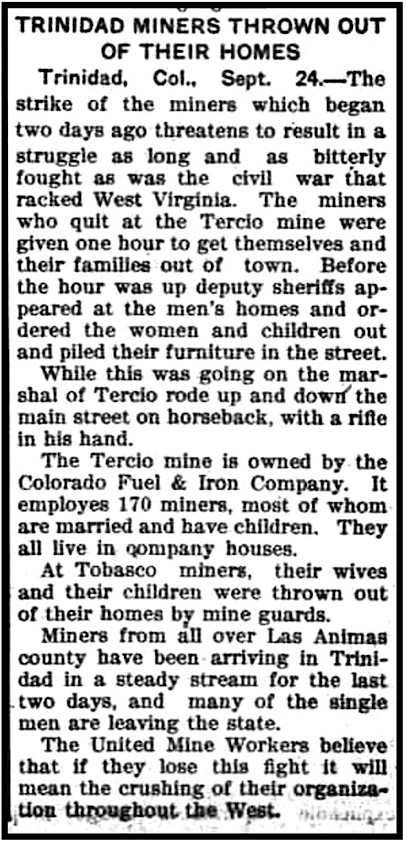
As the miners and their families were evicted from the company towns, Don MacGregor, a reporter from the Denver Express, was a witness and filed this report which was published September 24th:
No one who did not see that exodus can imagine its pathos. The exodus from Egypt was a triumph, the going forth of a people set free. The exodus of the Boers from Cape Colony was the trek of a united people seeking freedom.
But this yesterday, that wound its bowed, weary way between the coal hills on the one side and the far-stretching prairie on the other, through the rain and the mud, was an exodus of woe, of a people leaving known fears for new terrors, a hopeless people seeking new hope, a people born to suffering going forth to new suffering.
And they struggled along the roads interminably, in an hour’s drive between Tinidad and Ludlow, 57 wagons were passed, and others seemed to be streaming down to the main road from every by-path.
Every wagon was the same, with its high piled furniture, and its bewildered woebegone family perched atop, and the furniture! What a mockery to the state’s boasted riches. Little piles of miserable looking straw bedding! Little piles of kitchen utensils! And all so worn and badly used they would have been the scorn of any second-hand dealer on Larimer Street.
Prosperity! With never a single article even approaching luxury, save once in a score of wagons a cheap gaily painted gramophone! With never a bookcase! With never a book! With never a single article that even the owners thought worth while trying to protect from the rain!
[Emphasis added]
John Lawson, International Organizer for the United Mine Workers of America, was on hand through-out the day. When a superintendent taunted him by shouting, “A good day for a strike,” Lawson replied:
Any strike-day would look good to the people from your mines.
At Ludlow, Lawson helped to set up the canteen and greeted arriving families with milk and hot coffee as the rain turned into a snow.
One thousand tents being shipped from West Virginia by the U. M. W. have been delayed. At the Ludlow Tent Colony, many miners and their families spent the night in the big central tent. Some were taken to local union halls, and others were given shelter in the homes of nearby union sympathizers. The Greek miners, many of whom are single men, spent the night camped out in the snowstorm.
 —————
—————
Hellraisers Journal – Wednesday September 17, 1913
Calumet, Michigan – American Flag Knocked to the Ground by Guardsmen
From the Chicago Day Book of September 16, 1913:
Saturday Morning September 13, 1913
Calumet, Michigan – Big Annie and Her American Flag Attacked by Guardsmen
Just days after her arrest Big Annie is back in the thick of the fight. This morning she led a march of 1,000 strikers and the women who support them through the streets of Calumet as is her usual routine. At the corner of Eighth and Elm, they were confronted by the militia and armed deputies. A soldier on horseback used his saber to knock her flag from her grasp. A striker came to her aid and was pushed to the ground by another soldier who ripped the silk fabric of the flag as he slashed about with his sword.
Annie was also knocked to the ground. The flag was stomped into the mud by the horses of the guardsmen. Big Annie hung on to the flag as soldiers tried to take it from her, shouting:
Kill me! Run your bayonets and sabers through this flag and kill me, but I won’t move. If this flag will not protect me, then I will die with it.
Annie was rescued by other marchers and escaped with only a bayonet blow to the right wrist. The strikers’ march was driven back by soldiers on horseback and by the rifle butts of infantrymen. Deputies joined in on the attack swinging their clubs. The strikers and their supporters retreated to the Italian Hall with Big Annie and her flag, now muddied and slashed.